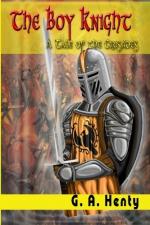Although it was morally certain that the page could not have purchased the services of the men who assisted him, from his own purse, or gain them by any means of persuasion, but that they were either the followers of the Count of Brabant, or ruffians hired with his money, as no proof could be obtained the matter was allowed to drop.
The earl felt, however, that an accusation against the count by him of an intention to commit a high crime, and this merely on the evidence of his page, would appear like an attempt to injure the fame of his rival.
Feeling, therefore, that nothing could be done save to watch, he left the matter entirely in the hands of his page, telling him that he could take as many men-at-arms or archers as he might choose and use them in his name.
Cnut entered warmly into Cuthbert’s plans; and finally it was arranged between them that six of the archers should nightly keep watch opposite the various entrances of the bishop’s palace and of the two monasteries joining. Of course, they could not patrol up and down without attracting attention, but they were to take up posts where they could closely observe the entrances, and were either to lie down and feign drunken sleep, or to conceal themselves within the shadow of an arch or other hiding-place.
Down on the seashore Cuthbert made an arrangement with one of the owners of small craft lying there that ten of his men should sleep on board every night, together with some fishermen accustomed to the use of the oar.
Cuthbert himself determined to be always with this party.
Night after night passed, and so long a time went by that Cuthbert began to think the design must have been given up.
However, he resolved to relax none of his watchfulness during the remaining time that the expedition might stop in Sicily.
It was in January, three weeks after the first watch had been set, when one of the men who had been placed to watch the entrance to one of the monasteries leaped on board the craft and shook Cuthbert by the shoulder.
“A party of some five men,” he said, “have just issued out from the monastery. They are bearing a burden—what, I cannot see. They were making in the direction of the water. I whistled to Dion who was next to me in the lane. He is following them, and I came on to tell you to prepare.”
The night was pitch-dark, and it was difficult in the extreme to see any one moving at a short distance off.
There were two or three streets that led from the monastery, which stood at the top of the town, toward the sea; and a party coming down might take any of these, according to the position in which the boat they were seeking was placed.
Cuthbert now instantly sent five or six of his men with instructions to avoid all noise, along the line of the port, with orders to bring in word should anyone come down and take boat, or should they hear any noise in the town. He himself with the sailors loosed the ropes which fastened the boat to shore, got out the oars, and prepared to put off at a moment’s notice.




